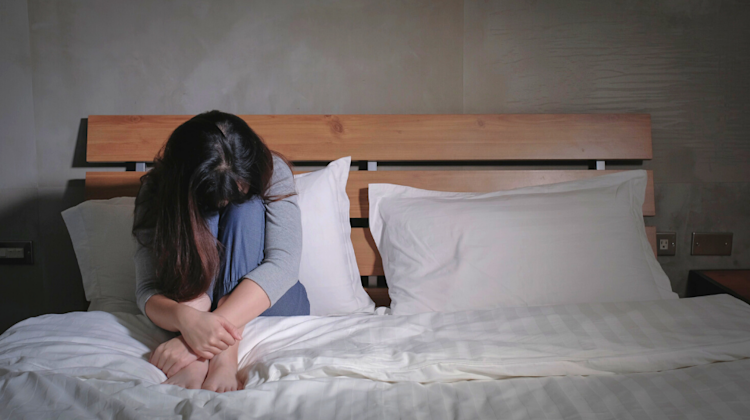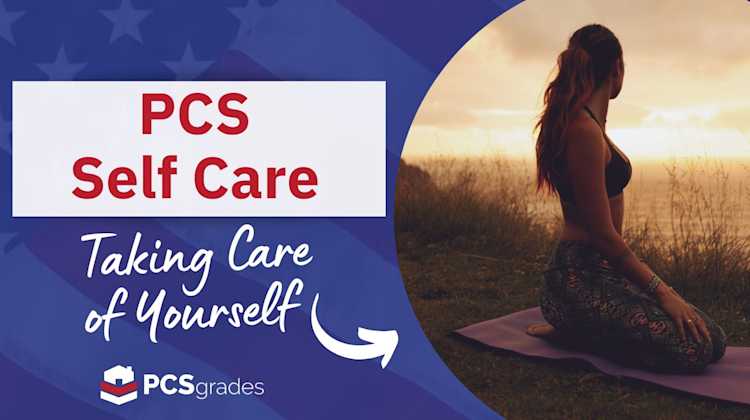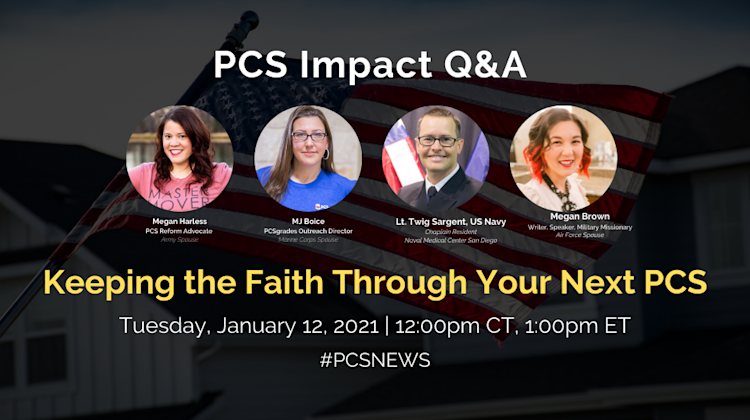Mental Health While PCSing
by Lizann Lightfoot - December 13th, 2021

PCSing can take a toll on your mental health. PCSgrades wants to support military families before, during, and after every PCS move. So we asked milspouse Corie Weathers to share her best mental health insights with us.
Weathers is an Army spouse, currently stationed in Fort Hood. Weathers is a licensed professional counselor who has worked with military families for 20 years now. She agrees that moving is a tough transition for anyone. She says, "we have moved more than average: 7 times in 9 years! I know how stressful this can be. My biggest weakness is adaptability, so if I can do it, then anyone can!"
What are some mental health challenges before a PCS move?
It is a major transition for everyone, no matter how often you move. For many families, the full year before a move is full of uncertainty and stress. Everyone approaches change and stress differently, so it is possible to simultaneously be excited and worried and grieving. Every duty station is a fresh chance to re-create your identity, and sometimes that can be healthy to get a fresh start. You may handle each move differently than previous moves, so try to be aware of your own strengths and challenges. Give yourself the grace to be excited or grieve.
It can be common to disconnect from activities and friendships during that time. Military kids, especially, may stop engaging in relationships and activities. Remember that relationships are crucial to your well-being. They bring you joy as you prepare to move, and they may help you transition and settle in at your new location.
What strategies can strengthen your mental health before a PCS?
Even if you are really busy, don't be afraid to make a quick mental health appointment. You don't have to get a super deep dive, but just getting 2 telehealth appointments can really help you feel mentally prepared for the move.
The only thing we can control is ourselves, so it's important to be aware of what is happening within yourself. During times of stress, couples need to continue communicating with each other, so do a quick check-in and let them know if you are feeling at 60%. This is an opportunity to ask for what you need in response. Do you need help with kids, doing checklist tasks, packing boxes, etc? Don't feel shame, just communicate when you aren't feeling at your best.
What communication tips make a PCS go more smoothly?
None of us make great decisions when we are hungry, angry, lonely, or tired. There's an acronym for that--HALT. Be careful of having huge emotional conversations when you are tired or hangry. Try to plan PCS logistics when you are both fed and not exhausted. We need to be graceful with our spouse, especially if we are out of sync and not at the same energy level. Service members may feel more excited about their job, anticipating some improvements at the next location, and the spouse may be feeling dread or disappointment. Those positions can be flipped, too. It's normal to have different experiences, but you have to communicate through it.
What should we prioritize to strengthen mental health during a PCS?
Focus on how you can take care of yourself during a move. Make sure you are still sleeping. The first thing that goes out the window during a PCS is always exercise and nutrition. Balance is important. Think about a spectrum of extremes: you don't want to be on the absolute end of either extreme. You shouldn't abandon self-care, but you also shouldn't set goals that make the entire family revolve around you or that will be unrealistic. The healthy balance is something in between that lets you take care of yourself in short, simple ways.
How do PCS moves stress our relationships, and what can we do about that?
Neither person in a couple should take the other for granted during the PCS process. Communication is huge for all of it. Some tools are overly complicated, so a simple strategy is a 5-minute check-in that you can use almost daily during a stressful time without spending extra effort. Most conflict will happen when we are HALT (see above) or out of sync with each other. It's just four questions that you can answer all at once, in 1-2 sentences max.
First, what are you physically feeling? (This lets you bring up HALT, sleep issues, pain from lifting boxes, etc.)
Second, what's on you mind, your thoughts? (wondering how kids will adjust)
What are your emotions about those thoughts? (nervous, anxious, sad, overwhelmed)
What do you need? (time for a nap, help around the house, a healthy meal, etc.)
If you find yourself in conflict, try to extend grace and not focus on huge topics or hurts in your relationship. If neither of us are at our best, let's just inch forward and continue to be kind to each other. It can be similar to the stressful period before a deployment. Remember that you are doing this together as a team, and try to avoid lose-lose approaches to problems.
After a PCS, it can take months to recover. What should we expect during this time?
After a few moves, you may have learned some strategies to get settled faster, like getting the kids in school, finding doctors and grocery stores, etc. There are some great checklists and programs out there to help you through that, but they usually don't address the mental health side.
After a move, within the first year, you are just trying to establish roots and create order. Some of that may happen quickly, like unpacking the chore chart or signing up for a gym membership. The first 3 months are usually filled with gritty logistical details, but we need to move past logistics to a place of fulfillment and joy.
How can we make progress during this stage?
Maslow's Hierarchy of Needs tells us that all humans are striving towards meaning and fulfillment in life, but it is like a ladder. The very bottom rung of the ladder is the basic needs of survival--food, clothing, and housing--and that's the stage we are stuck in during a PCS. And it's okay to be there temporarily, but we don't want to hang out there too long! The very next rung of the ladder is order and routine, which is why we strive so hard to find routine right after a PCS.
The next ladder rung is community, which is why joining local clubs or activities help you find joy and meaning. The service member usually has a sense of meaning and purpose behind their PCS, but the spouse and kids may not have that same sense of community and purpose, so they sometimes adjust at different rates.
How has COVID impacted mental health after PCS moves?
Since COVID happened, the "year of firsts" has been stretched out because so many community events were cancelled. So don't worry if it is taking longer. It's natural to feel apathy, general unhappiness, and a lack of connection during that time. Usually, the second year we are done focusing on logistics and have extra time, energy, and capacity to focus on building community, pursuing interests, finding our purpose, and seeking activities that truly bring us joy. So make space for your hobbies and habits to discover things you can look forward to each day.
How do physical and chemical changes affect mental health during a PCS?
After a stressful move, your adrenal gland has been depleted from all the spikes of fear and stress. You may have been producing way too much adrenaline, which can lead to a deeper crash afterwards. The only way to recover is to take care of yourself physically--better rest, nutrition, and gentle exercise. As a military community, we have been through a LOT in the past few years. If you need extra support, don't be afraid to reach out. You want to move forward and keep getting better, not hang out in a place that has no satisfaction or meaning for you.
What message do you have for military families about PCS moves?
I want to encourage you that we are all human beings. Struggle, suffering, and difficulty all build character. We are not expected to do this all perfectly without struggling. We all know what it is like to struggle through things. Don't worry about getting it right every time. Focus on taking care of yourself during the journey.
If you need to go out and get the professional help to walk along beside you, then don't be afraid to get that 3rd party person to support you. You can do that through professional counselors that are covered by Tricare benefits, or you can do coaching sessions to do a check-in. Military OneSource is a great example of a way to get 12 free sessions to focus on whatever you need to cover during a PCS move. About every other move, I get a counselor myself, just to help me have accountability, identify areas where I am doing things well, and get suggestions for improvement in other areas.






